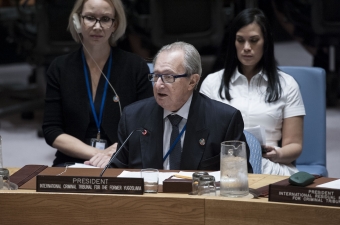ICTY President Carmel Agius today addressed the United Nations Security Council, delivering his penultimate progress report on the Tribunal’s completion strategy in the lead up to its closure on 31 December 2017.
The President stressed that the ICTY remains on track to complete its mandate by the end of this year and has made considerable progress towards completing the final trial and appeal proceedings. Both the Mladić trial and the Prlić et al. appeal are on schedule, with judgements in both cases expected to be delivered by end of November 2017, as previously announced.
However, President Agius emphasised that there are still significant obstacles requiring the urgent attention of the Security Council. One such challenge is the pending contempt case of Jojić et al., in which the Republic of Serbia has failed to comply with its duties under the Tribunal’s Statute by refusing to execute arrest warrants of the accused that were issued almost two and a half years ago. The President recalled that he had formally referred Serbia’s non-compliance to the Council in a letter dated 1 March 2017, stating that “The Republic of Serbia is in violation of its international obligations every day that these arrest warrants and orders for transfer are not executed. The Security Council has the capacity to tackle this issue, and it is imperative that it takes decisive action.”
President Agius reported on the further challenge of continued staff attrition, which will pose a critical risk to the Tribunal’s ability to complete its remaining work on time. He added that incentives to retain staff would enable the Tribunal to ensure that its mandate is completed in an optimal manner, reiterating once more the need for urgent support from the United Nations in this regard. The President also acknowledged and thanked all staff members and Judges for their outstanding work and dedication.
Finally, President Agius noted that the Tribunal’s final year of operations presents a unique opportunity to ask what the Tribunal’s enduring legacy will be, and to ensure that it will continue to have an impact in the future. For these reasons, the Tribunal is holding a number of legacy and closing events designed to engage with those most affected by the Tribunal’s work and to enable others to build upon its achievements and experience. He mentioned In addition the ongoing project of establishing information centres within the region of the former Yugoslavia, as mandated by the Security Council, aimed at providing local access to the Tribunal’s public records and information about its work.
Concluding, President Agius said: “No institution can restore what was lost in the Yugoslav wars, or undo the terrible crimes committed during them. The Tribunal has demonstrated, however, that when the international community has the will to co-operate and to stand for what is right, those responsible for the most egregious violations of international humanitarian law can be held to account.” The President asked all Members of the Security Council to continue to stand for what is right, and to support the Tribunal in its last six months.


